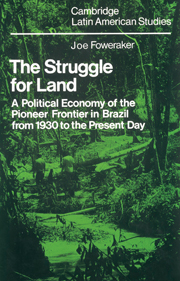 The Struggle for Land
The Struggle for Land Book contents
- Frontmatter
- Contents
- List of maps
- Preface
- Glossary of acronyms and abbreviations used in the text
- Glossary of words and phrases in Portuguese used in the text
- 1 Brazil: political and administrative divisions
- 2 Principal frontier regions
- 3 West Paraná: estates and municipalities
- 4 South Pará
- 5 South Mato Grosso
- Part 1 The pioneer frontier
- Part 2 Political mediation
- Part 3 Accumulation and authoritarianism
- Bibliography
- Index
- CAMBRIDGE LATIN AMERICAN STUDIES
- Frontmatter
- Contents
- List of maps
- Preface
- Glossary of acronyms and abbreviations used in the text
- Glossary of words and phrases in Portuguese used in the text
- 1 Brazil: political and administrative divisions
- 2 Principal frontier regions
- 3 West Paraná: estates and municipalities
- 4 South Pará
- 5 South Mato Grosso
- Part 1 The pioneer frontier
- Part 2 Political mediation
- Part 3 Accumulation and authoritarianism
- Bibliography
- Index
- CAMBRIDGE LATIN AMERICAN STUDIES
Summary
The pioneer frontier in Brazil may appear at first sight to be another of those rather recondite topics, of concern only to academics. A moment's consideration, however, should be enough to recognise its claims to general interest. This frontier pits man against nature, and demands domination of the physical environment, which is the basis of all economic activity. It involves millions of people over several decades in a massive input of human labour and creation of economic wealth. In its advance it also pits man against man and reveals social and political relationships which often remain hidden within the confines of national society. And with its advance into Amazonia it becomes the world's ‘last great frontier’, and marks the beginning of the end of a chapter in human history.
I first went to the frontier some ten years ago, and was immediately captivated by the atmosphere and the action, and by the courage of the pioneering peasants. I was struck by the vividness of the experience, and the closeness of earth and elements. At a showing of a ‘spaghetti’ western in Capanema (Paraná) I was hard put to tell actors from audience. But this romantic vision was soon tempered by the everyday violence of the peasants' lives, and their fears and anxieties. This was evidently less a question of the brutal battle with nature than of ‘man's inhumanity to man’.
- Type
- Chapter
- Information
- The Struggle for LandA Political Economy of the Pioneer Frontier in Brazil from 1930 to the Present Day, pp. ix - xiiiPublisher: Cambridge University PressPrint publication year: 1981
